Genocide, Religion and Atonement in Liberia
An Interview
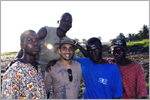 Introduction
IntroductionRyan Lobo is a photographer and a filmmaker who has traveled to the remotest parts of the globe in search of interesting subjects. Some time in the second half of 2008 he traveled to Liberia on the west coast of Africa to make an investigative biographical film about a preacher named Joshua Milton Blahyi, who was once a general, right-hand man and spiritual advisor to Master Sergeant Samuel K Doe, who became Head of the People’s Redemption Council and later President of Liberia through a bloody coup in Ryan Lobo with Liberian friends 1980.
Murdered during the coup was the President William R Tolbert Jr - and executed publicly 10 days later were thirteen cabinet ministers under Tolbert. A rebellion subsequently broke out and most of Liberia was controlled by the rebels under Charles Taylor in 1990, when Doe was captured, tortured and executed by a faction led by Prince Y Johnson. Joshua Milton Blahyi went under the name of General Butt Naked because he believed that fighting naked would make him invincible. Blahyi is credited with having been personally responsible for the killing of around 8000 people under Doe and afterwards. By his own admission he has indulged in cannibalism and even kicked the decapitated heads of human beings like footballs. Ryan Lobo was able to personally interact with the now reformed Joshua Milton Blahyi and he relates his experiences in this interview.
Phalanx: How did the idea of making a film about the former ‘General Butt Naked’ first occur? How did you first meet him?
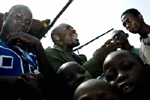 RL: My business partner at the time Eric Strauss came up with the idea of a character-driven documentary about him after we discussed some ideas and after paying our own ways, four film professionals including myself flew into Monrovia, the capital of Libera from Ghana to shot an independent film on Joshua. When I got off the plane it turned out that Joshua Blahyi had been on the same flight sitting right behind me. My colleagues pointed him out in Monrovia and I was introduced to the former General. He was in fatigues and was wearing a camouflage cap that had the word “LEVIS” on it.
RL: My business partner at the time Eric Strauss came up with the idea of a character-driven documentary about him after we discussed some ideas and after paying our own ways, four film professionals including myself flew into Monrovia, the capital of Libera from Ghana to shot an independent film on Joshua. When I got off the plane it turned out that Joshua Blahyi had been on the same flight sitting right behind me. My colleagues pointed him out in Monrovia and I was introduced to the former General. He was in fatigues and was wearing a camouflage cap that had the word “LEVIS” on it.Blahyi preaching in Monrovia
Phalanx: Can you say something about the political history of Liberia?
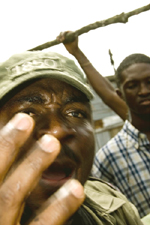 RL: Liberia was actually a creation of freed slaves from the United States of America who established it as a colony in 1822. The name Liberia announces this event. The freed slaves were apparently thankful to the American President James Monroe and they named their capital Monrovia. In 1847 the colony of freed slaves declared independence and founded the Republic of Liberia. The freed slaves settled on the coast and the people on the coast dominated politics in Liberia for more than a century. These coastal people are called Americo-Liberians and are very different from the tribes who inhabit the interior regions. Many still dress “American style”, are very particular about outward appearances and walking down a Liberian city street one might feel they are in New Jersey if one was to look at the number of basketball shorts and vests about. The relationship between the two groups, namely the Americo-Liberians and the interior tribes deteriorated over years of misgovernance and exploitation. The Krahn tribe was a particularly influential tribe under Doe, who was Krahn himself. These groups changed the political equations when one of them - Samuel Doe came to power in 1980 through a coup. Doe represented the unrepresented tribals from the interior and executed many ministers from the former regime.
RL: Liberia was actually a creation of freed slaves from the United States of America who established it as a colony in 1822. The name Liberia announces this event. The freed slaves were apparently thankful to the American President James Monroe and they named their capital Monrovia. In 1847 the colony of freed slaves declared independence and founded the Republic of Liberia. The freed slaves settled on the coast and the people on the coast dominated politics in Liberia for more than a century. These coastal people are called Americo-Liberians and are very different from the tribes who inhabit the interior regions. Many still dress “American style”, are very particular about outward appearances and walking down a Liberian city street one might feel they are in New Jersey if one was to look at the number of basketball shorts and vests about. The relationship between the two groups, namely the Americo-Liberians and the interior tribes deteriorated over years of misgovernance and exploitation. The Krahn tribe was a particularly influential tribe under Doe, who was Krahn himself. These groups changed the political equations when one of them - Samuel Doe came to power in 1980 through a coup. Doe represented the unrepresented tribals from the interior and executed many ministers from the former regime.Phalanx: Blahyi was associated with Doe. What was his position?
Joshua Blahyii in Monrovia
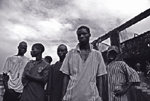 RL: Joshua was High Priest of the Krahn tribe, a position his ancestors had also held. Since Doe was a Krahn, he was automatically under Blahyi’s jurisdiction and Joshua had a great deal of power and influence under Doe. In order to protect Doe, he inserted Talisman’s under Doe’s skin – fingertips, arms, feet, anus, torso and so on. After Doe’s death there was civil war in Liberia between 1989 and 1998 and Joshua fought with a faction led by Roosevelt Johnson. Many of his worst acts were committed around 1996. One could say that since the High Priests are given to human sacrifices, the vocation of a general and that of the High Priest might not be so contradictory. Human sacrifices for Joshua often involved killing little children and eating their hearts. Some of these children, Blahyi made it clear, were not kidnapped but Former child soldiers now
RL: Joshua was High Priest of the Krahn tribe, a position his ancestors had also held. Since Doe was a Krahn, he was automatically under Blahyi’s jurisdiction and Joshua had a great deal of power and influence under Doe. In order to protect Doe, he inserted Talisman’s under Doe’s skin – fingertips, arms, feet, anus, torso and so on. After Doe’s death there was civil war in Liberia between 1989 and 1998 and Joshua fought with a faction led by Roosevelt Johnson. Many of his worst acts were committed around 1996. One could say that since the High Priests are given to human sacrifices, the vocation of a general and that of the High Priest might not be so contradictory. Human sacrifices for Joshua often involved killing little children and eating their hearts. Some of these children, Blahyi made it clear, were not kidnapped but Former child soldiers now
drug addicts offered for sacrifice by their mothers though he admits that he murdered countless children in numerous rituals that involved ophiophagy, torture and murder. During the siege of Monrovia Joshua Blahyi by his own admission killed a huge number of people personally. He and his battalion of child soldiers also killed a number of UN Peacekeepers.
Phalanx: When did Blahyi see the ‘light’ if I may be allowed to use a cliché?
RL: He told me it happened in 1997-98. He had apparently killed a little girl and had just eaten her heart. He heard a mysterious voice telling him that he was controlled by demons and that they were on his shoulder and not at his feet and when he went into battle later that day, his gun jammed. Before that there was a Baptist pastor named Kun-Kun who had accosted Joshua Blahyi and admonished him for his ways. Blahyi might have killed Kun-Kun but did not do so as he was so shocked by Kun Kuns courage and stubbornness. He believes Kun Kun was protected by God.
Later he was filled with fear after his gun jammed and believed that he had lost power and that Jesus Christ was all that more powerful than his deity. He went and hid in Kun-Kun’s house. We double checked whatever Joshua said to us and Kun Kun confirmed all the “confirmable” details if you will as well as other people. In any case, seeing the ‘light’ as you put it simply meant an acknowledgment that Jesus was a more powerful god than the Krahn god he had worshiped until then, as Joshua says.Phalanx: What evidence did you see of Joshua Blahyi’s change of heart?
RL: We traveled a lot with him within Monrovia. He took us to a slum in Monrovia called Xolalli which is populated largely by former child soldiers, many of whom Joshua Blahyi had himself led. He is in his late thirties now, which means that when Samuel Doe was killed in 1990 he was only about 20 years old. He had, in effect, been Samuel K Doe’s spiritual consultant when he was in his teens. He fought when still an adolescent and he had his change of heart when about 27 or 28. The child soldiers were of course even younger. They fought when they were ten or eleven years old, like something out of ‘Lord of the Flies’ if you will except that they had AK 47's instead of stones. They were given drugs to get them to fight and many are drug addicts now. Joshua Blahyi tries to work with them today, to get them to quit drugs, get trained and to find jobs. He preaches and his general intention is to do good.
Phalanx: Does he feel remorse?
RL: That is the question that was put to him many times. At times he said he was remorseful and deeply sorry for what he did. He also says that he was in the control of demons when he did so which might be contradictory. Now, he wants to do good and rectify his wrongs in whatever way he can. May be he wants to follow a more powerful god as well and says he is grateful that he has been forgiven by God. He is thankful for his family as well.
I asked him about his childhood, his likes and dislikes and the kinds of things he likes to eat and so forth... small details but revealing ones. I think he is like a big child now and maybe he was before as well. His crimes were appalling and it seemed to me that a child would be so much more brutal and cruel if he believed what he was doing was sanctioned and right.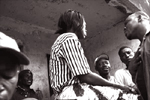 Phalanx: What about his former victims? How do they react to his new avatar?
Phalanx: What about his former victims? How do they react to his new avatar?
RL: Many people would love to kill Joshua. Once, when he stood up to preach in a slum a woman screamed at him. He had apparently killed her brother because he spoke French and he had eaten this man’s heart. French was the language spoken by another faction against Joshua’s at the time and Blahyi identified the man with that faction. Joshua Blahyi’s response to the angry woman was to beg forgiveness and he fell to the ground and clasped her feet for several minutes saying that he was sorry quietly and repeatedly. After a while this woman simply walked away after patting his head in what seemed to me to be an act of forgiveness. There are many people in Liberia who want Blahyi tried for his crimes Pastor Blahyi begs forgiveness
from victim and Blahyi responds by asking for the same thing – to stand trial and be punished in whatever way a court sees fit although punishment, probably, would be death. Being a war criminal seems to be more the rule than the exception in Liberia and many current senators including Prince Johnson who tortured a former head of state to death are still in positions of power. The current President supported Charles Taylor who is currently in the Hague on war crimes charges. An organization in Liberia currently attempts to get war criminals to stand trial as they believe that across Africa this will repeat itself if people are not held accountable.
Phalanx: Does Blahyi regard himself as a ‘Liberian’, a ‘Christian’, an ‘African’ or a ‘Krahn’?
RL: Difficult question. It would appear that the national identity – the fact of being Liberian – is largely the privilege of those on the coast, those who are descendants of former slaves or strongly influenced by them. Most of the others seem to regard their tribal identities as most important to them, Blahyi in some ways included. I don’t think religion plays a part in one’s identity because many people can belong to more than one religion if you will. Being ‘African’ may also not mean as much. Even Christians in Liberia still believe in bush spirits and demons and more arcane forces are believed to play a very important role in most people’s lives. The mystical world or spirits and demons is very strong in Liberia and permeates life there. Blahyi has renounced his tribal religion and is now a Christian preacher. He strongly believes that he is a follower of Christ now and rejects his occult past. He still believes in evil forces that he believes controlled him for his past actions.Phalanx: What language do the people speak in?
RL: English.Phalanx: Can you say something about black/ white/ Indian relationships in Liberia?
RL: I think Indians are largely perceived as middlemen and merchants while white men may represent opportunity to Liberians in some way. Indians and Lebanese in Liberia are largely in business and are seen to be (generally speaking) intelligent and “crafty” people as one man put it to me.Phalanx: Do you think of Joshua Blahyi as a monster?
RL: I believe his crimes are appalling and that he will have to answer for them. He wrote to me when I got back here and we are still in touch. I guess it is difficult to judge someone you know like this even when he has done things unspeakable. There are different ideas of justice and redemption and Joshua seems to have his own for sure. He seems to be reformed but that does not undo his crimes or the suffering he has caused.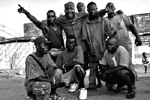 The easiest response to someone like Joshua Milton Blahyi is to express horror at the kind of deeds he is accused of - and to which he admits. The next reaction will be to look for signs of remorse or Christian repentance from Joshua Blahyi since he went on to become a preacher and now lives, morally, a more ‘blameless’ life. Obviously, these responses are inadequate when one discusses Central Africa and the happenings in countries like
The easiest response to someone like Joshua Milton Blahyi is to express horror at the kind of deeds he is accused of - and to which he admits. The next reaction will be to look for signs of remorse or Christian repentance from Joshua Blahyi since he went on to become a preacher and now lives, morally, a more ‘blameless’ life. Obviously, these responses are inadequate when one discusses Central Africa and the happenings in countries likeLiberia, and we need to be less judgmental and more understanding. Here are some facts/ possibilities about Joshua Blahyi/ General Butt Naked and Liberia that emerge from this interview:
Blahyi with former child soldiers
1. |
While Joshua Blahyi has been responsible for (by all the standards of ‘civilized society’) of the most appalling acts of brutality, he is really in no fear for his own life. He is prepared to tread the same ground where his enemies are baying for his blood. In fact, compared to India’s own politicians, he has virtually no security of any kind although he has apparently more enemies. |
2. |
He appears to have embraced Christ although this is not unrelated to the Christian God being more powerful. |
3. |
He appears to be more than willing to face punishment. He might even welcome being executed as a war criminal. |
4. |
Violence and taking lives is a far more common phenomenon in Liberia than ‘civilized people’ are accustomed to. It also appears that the value placed upon a human life in Liberia is somewhat less than that placed upon it by ‘civilized people’. The corollary to this is that death apparently does not hold the same terror to a Liberian that it does to the ‘civilized’. |
5. |
There is no ‘transcendental object’ to which someone might sacrifice one’s life – like religion or nation – since neither religious nor national identities are strong enough to demand it. One can change one’s religion if another god is stronger and live a life dictated by that religion - without disowning the earlier life dedicated to a less powerful god. When Joshua Blahyi talks of the tribal god being ‘evil’ he may have simply appropriated the vocabulary of his new religion – Christianity – without attaching much importance to the word ‘Evil’. In the same way, the word ‘Good’ may have less significance to him. ‘Good’ is probably a term associated with Christianity, just as ‘Evil’ is a term associated with his tribal religion. Devils in Christian practice were originally pagan gods and the same thing may be happening in Joshua Blahyi’s mind. The ‘renouncing’ of tribal gods may therefore signify a religious realignment on Joshua Blahyi’s part rather than ‘moral torment’ of some profound sort. In any case, moral torment is more likely to be experienced when one has not lived up to what one has believed in rather than when one changes one’s beliefs – since we cannot seriously advance the view that one kind of faith is inherently ‘more valid’ than another. To phrase this differently, since faith is not arrived at through argument, and morality cannot also be separated from the dictates of one’s creed, no person who follows his faith strictly can be said to have done ‘wrong’. Joshua Blahyi may have no sense of having done ‘wrong’ as a Krahn high priest since even human sacrifices were part of his religious duties. When he became a Christian pastor he was perhaps simply changing the tenets he was following. It is difficult to see this shift resulting in ‘moral torment’ for Joshua Milton Blahyi. Attributing ‘moral torment’ to him in these circumstances would be tantamount to acknowledging Christianity as the ‘true’ way and tribal religion as ‘Evil’. |
While it may be politically incorrect not to endorse the cliché that all lives are equally valuable, in practice there are huge differences in the actual value placed upon the life of the individual by different cultures or sub-cultures. The Judeo-Christian world placing such a huge value upon it cannot be unrelated to the valorization of the single life allowed to each soul, culminating in a final judgment. During a recent visit to Zanzibar and conversations with an African friend it became apparent that the life expectancy in Central Africa is so low that living beyond fifty is considered exceptional. People need to virtually prepare for death quite early. It also came out that suicide is a rare phenomenon and my African friend did not know of anyone who had taken his or her own life. Although he attributed this to suicide being frowned upon by religion, it can be argued (perhaps like Albert Camus) that suicide is an act of individual defiance with a corresponding discourse. It is perhaps only when someone places a high value on his/ her own life that he/ she will take the extreme step of killing herself/ himself.
Joshua Milton Blahyi is now a self-professed Christian and his desire to be tried and punished may be a desire to seek martyrdom. ‘The imitation of Christ’ implies living a life as ‘Good’ as that of Jesus Christ but one wonders if Joshua Blahyi is not attempting to imitate Christ by seeking martyrdom and death instead. Given the low value perhaps placed upon the life of an individual in Liberia, martyrdom may also not be as difficult to embrace as it was in Judea. Joshua Blahyi may only be offering the single thing of not much value to him – his life.
Editor